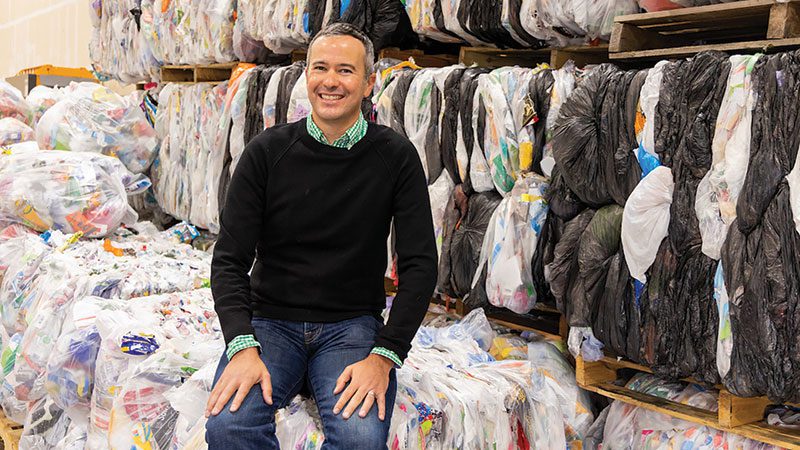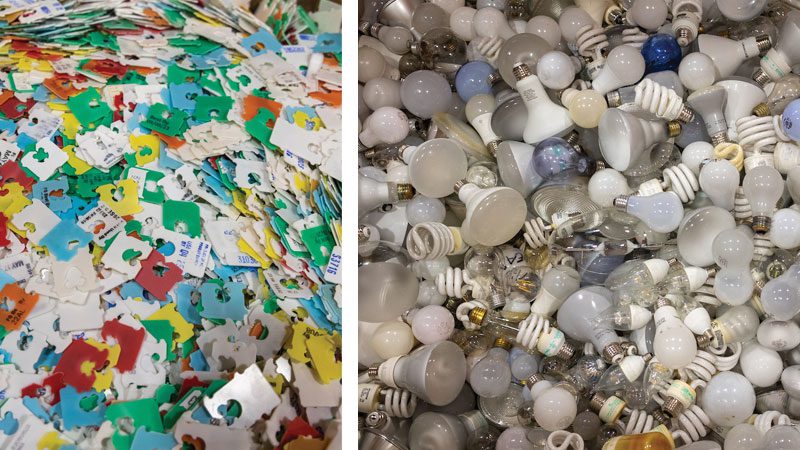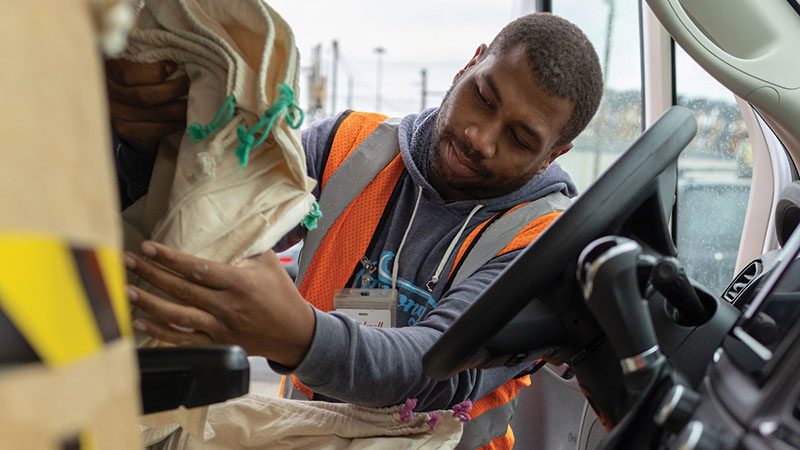How Ridwell reinvented recycling for a new era
By Rebekah Denn, photos by Meryl Schenker
This article was originally published in January 2024

How Ridwell Reinvented Recycling for a New Era
If one man’s trash is another man’s treasure, the Ridwell warehouse in south Seattle is a regional gold mine.
Chip bags and bubble wrap and Amazon Prime mailing envelopes are crushed into dense, neatly packed bales that weigh hundreds of pounds apiece. Dead batteries and dead light bulbs, Styrofoam and old clothes and older phone chargers fill tall bins to the brim, all awaiting new life.
Leaders of the Seattle-based company, now operating in eight states, estimate it’s saved 15 million pounds of material from landfills since its creation in 2018. Originally dubbed Owen’s List after CEO Ryan Metzger’s then-six-year-old son, it began as a weekend father-son project in 2017 trying to deal with dead batteries piled up in their basement. They didn’t want to throw potentially hazardous materials in the trash going to the landfill, so Metzger called—and called and called—until he found where to recycle them.
The pair started picking up extra batteries from neighbors, doorsteps in a sort of reverse newspaper route, including other hard-to-recycle items along the way, sending email alerts about which product they planned to collect that week and then how it was reused.
A mere five years later, Ridwell has added thousands of miles to its territory, more than 200 employees and more than 100,000 customers, with vans and 53-foot truck trailers replacing Metzger’s family car and occasional rented U-Haul. For a monthly fee starting at $14 (discounted for PCC members), Ridwell now picks up all sorts of items that aren’t accepted in municipal recycling bins. Workers sort and package them and send them to partners for reuse.
Plastic film from the Seattle region is transformed into Trex decking, batteries go to Northwest-based Ecolights for recycling and so on. The company tracks all pickups and regularly audits the results, listing on its website partners in each region who use the materials, what percentage of each category is contaminated in each city and with what (#60 cotton, the fluffy plastic-wrapped blocks that keep meal delivery kits cold in shipping, showed up in “threads” fabric pickups in Los Angeles and Portland, multi-layer plastics in Seattle had issues with food residues and—fitting for our location—foil coffee bags). The company’s pledge is that “things go exactly where they should be going.”
Such guarantees have become crucial in the world of recycling—and private companies like Ridwell have become meaningful adjuncts to government services, clearing roadblocks that previously seemed insurmountable.
Recycling rise and fall
While King County has long enjoyed one of the highest recycling rates in the country, rates have stagnated in recent years here along with unusual national turmoil and industry challenges. Typical problems include the trend toward single-bin pickups where all recyclables are mixed, which increases the odds of contamination. Then there’s so-called “wishcycling,” when households put items in those residential bins that seem like they might be recyclable but really aren’t. It’s hard to blame individuals for a lot of the confusion; the Environmental Protection Agency even asked the Federal Trade Commission last year to stop using the familiar circular-arrows recycling symbol on most plastics, since only those labeled “1” and “2” are commonly accepted nationwide. (Seattle doesn’t use the number system when determining what plastics are recyclable; municipal customers can look up which items can be recycled in their bins here. King County also recently launched a new endeavor called Re+, aimed at reducing the amount of reusable and recyclable materials sent to landfills.)
Nationwide, the problems definitely also include economics—the fact that some items could technically be recyclable, but it costs much more to sort and recycle them than to dump them in landfills. And in recent years, the industry has also been shaken by a completely disrupted marketplace.
The chief blow to standard municipal recycling came in 2018 when China, the destination for the majority of U.S. recycled plastics, paper and scrap metal, stopped accepting 24 categories of recycled items and announced strict new contamination standards for others that most U.S. facilities could not remotely approach.
As a governmental task force in King County reported in 2019, China’s policy change required that our area find new markets among “extremely limited” options for the roughly 214,555 tons of mixed paper and mixed plastics that was previously generated in King County and Seattle annually and sent to China.
Adding to those problems came a crisis in public trust about what happened to those recyclables after they left their recycling bins.
A 2022 Greenpeace report, for instance, said that when the U.S. exported plastic waste to China before 2018 it “counted it as recycled even though much of it was burned or dumped.”
And an ABC news investigation last year tried to track plastic bags and other plastic films collected in some businesses for recycling. The investigation suggested much of the plastic was dumped or incinerated instead.

Greenpeace suggested in its report that, while metal, glass, cardboard and paper could be effectively recycled, the conundrum around recycling plastics could never be solved—that plastics are too diverse, too hard to collect and sort, too toxic, too expensive to recycle. The “reduce” and “reuse” sides of the sustainability equation seemed like the only responsible routes.
And yet—for an added price—Ridwell is making headway, for plastics and other materials once destined for the trash.
“Some categories are harder to find homes for than others. But that’s basically what my team does,” said Matt Waymire, Ridwell’s partnerships program manager, surrounded at the Seattle warehouse by sorted bins that included thousands of plastic bread tags, old yard signs for political campaigns, old shoes and prescription pill bottles. “We do the research upfront, make sure that we find a suitable partner that can handle our volume, and then make sure that they can utilize the material to the best of its ability either for reuse or for recycling…
“We do a lot of warehouse visits…If we don’t feel satisfied with how it’s going to be used or where it’s going, what it might be used for, then it’s not a viable partner for us.”
Trash to treasure
In the Seattle facility in Georgetown’s industrial zone, 25 to 30 vans pull in each day after driving tightly plotted neighborhood routes where they pick up cloth bags of recyclables from the Ridwell-branded boxes that sit on front stoops like old-fashioned milk deliveries.
Every biweekly pickup includes plastic film, “threads” (old clothing and textiles), light bulbs and batteries, as well as the customer’s choice of a category of options that include corks, cords and chargers, eyeglasses, plastic bottle caps and more. A higher-priced plan includes multi-layer plastics in every pickup as well. Add-ons like Styrofoam and latex paint are available for extra fees, and Ridwell also does occasional pickups to benefit community nonprofits, such as collecting diapers or unused toiletries.
“Our members are some of the most dedicated recyclers I have ever seen” Waymire said, with contamination in the Ridwell bags at “incredibly low” levels. (For multi-layer plastics, Ridwell says its contamination rate is 2.7% compared to an industry average of 25%.) That care from members is a valuable resource on its own: Food remnants on a few pieces of plastic film could contaminate an entire bag, for instance, while wet items in a clothing bag could mold and ruin the rest.
On that day, as with most workdays, warehouse workers checked for contaminants or misfiled materials as they emptied heaps of Ridwell cloth bags that had been delivered the previous evening. They emptied bag contents into larger bins, picking out the occasional red flag like the Ziploc bag holding one home’s collection of batteries.

Batteries are removed from the bags and stored in barrels filled with Cellblock Ex, a granular material that looks “kind of like Dipping Dots mixed with kitty litter” as Waymire put it. Batteries, especially lithium batteries, have potential to cause fires. Cellblock Ex prevents fires, but also “if the battery heats up it will basically melt around the battery and encapsulate it so that it doesn’t spread.”
Once sorted and safely packed, the batteries are taken to facilities that separate them by chemical makeup, then sent on to even larger facilities around the country where they are ground up and melted down into their raw components and made into new batteries, or even other things like pots and pans or raw metal ingots.
A short walk from the batteries was the storage area for one of Ridwell’s specialty categories, prescription pill bottles.
At most municipal recycling facilities, the machinery can’t handle plastics smaller than a certain size—it varies from city to city, but generally the minimum size is three inches. “This would fall right through” Waymire said, holding up a standard translucent orange cylinder. “Most of the time they will fall through and then they just don’t get recycled. They just get swept up at the end of the day and sent to trash.”
Ridwell’s recycling partner washes the bottles to remove any remains of glued-on labels. “The facility we send it to has a very sophisticated plastic sorting (system) and they’ll separate it by type, like the number of the resin codes.” Prescription bottles typically are made from #5 polypropylene, a heat-resistant plastic that many municipal facilities also don’t accept. Ridwell’s partner “will separate it by color, then it’ll get fully washed, flaked, shredded up, and then they’ll melt it down and pelletize it into these little plastic pellets that can be sold to make new plastics.”
Each community Ridwell serves has slightly different needs and opportunities
By volume, plastic film is the largest category processed in the warehouse. The stretchy material, pervasive in packaging, can’t be recycled in municipal facilities and tangles up their production lines. At Ridwell it’s baled into pallet-sized bricks that weigh 800 to 1,000 pounds apiece, loaded into a 53-foot trailer for their next incarnation as Trex planks.
Each community Ridwell serves has slightly different needs and opportunities, partly because of differences in what municipal recycling facilities accept along with different city codes. Each area has its own warehouse and regional partners.
“It’s really (about) looking and really studying the communities,” said Metzger, a former marketing manager who once worked at a Seattle venture capital firm, advising startups on how to scale up. He formed Ridwell with three partners; wife Erin, a marketing consultant and entrepreneur, was also on the founding team. (Now 12, Owen still takes an interest, even if he’s not making deliveries anymore.)
“In Portland, for instance, the first members a few years ago said “if you could add clamshell (plastics), you’d be the most popular company in Oregon. And so that was the motivation we needed to do that and within a few months, we added it,” Metzger said. “It’s been a really big success and I can’t even imagine the number of full truckloads of clamshells that are going to our recycling partner instead of the landfill.”
One of the company’s biggest wins was for a vexing material that’s become ubiquitous in U.S. packaging, the light multi-layer plastics used in snack bags, candy wrappers, frozen food packaging, net produce bags and much more.
“Literally everybody has it, you cannot avoid it,” Waymire said.
Its challenges: “Plastic film is a mostly homogenous material. When it is being recycled, it can all be melted basically at the same melting point,” Waymire said. “Multi layer plastic has anywhere from three to 12 layers per bag (glued together). So you’ve got a layer for maybe like the outside color…you’ve got the layer for keeping in oxygen, you’ve got a layer for keeping sunlight out, you’ve got a layer for just general storage… all of those have different melting points and have to be handled at different temperatures, different recycling methods. And so it takes a lot of specialized equipment to be able to make this stuff, which is why it took us so long to find a couple great partners to be able to take it.”
Pallet-sized stacks of the tightly baled plastics are now processed daily, dense as bricks, the occasional bright Cheetos or Butterfingers wrapper discernible in the outer layer. They’re converted and compressed into potting and hydroponic gravel, colorful concrete-like building blocks and commercial and industrial drainage planks.
Ridwell’s two main goals are to get to more areas and to make more of an impact, Metger said. They go together.
“As we have more people that we’re serving in the Ridwell community, then we can do more. We never could have done multi-layer plastic three years ago, we couldn’t have filled the truck, couldn’t have had a baler.”
It’s a sharp curve for a home project that turned into much more.
“There was this massive unmet need. We were seeing that no one else was doing it. And at the same time, recycling was kind of going backwards,” Metzger said.
After China’s crackdown “the whole industry was saying, ‘Well, what are we going to do? What are we going to do?’ And yet there were people who wanted not only to keep what the industry was offering them, but actually to go forward and do a lot more.
“People are impatient for new ways to get rid of things that don’t go to landfills.”
LEARN MORE
For more information on Ridwell visit ridwell.com.
